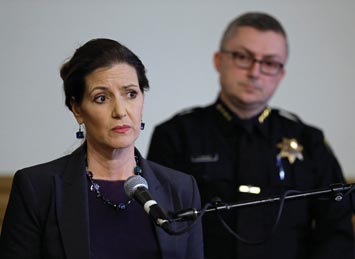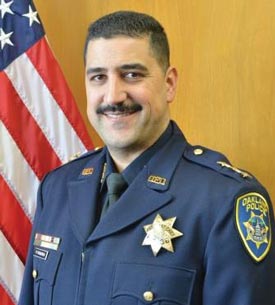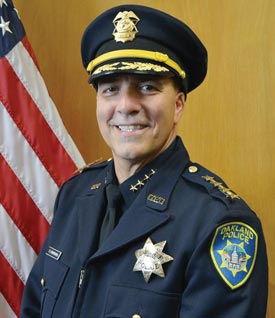Oakland loses three police chiefs amid growing scandals
By Final Call News | Last updated: Jun 21, 2016 - 9:39:01 AMWhat's your opinion on this article?

In this May 13, 2016, file photo, Oakland Mayor Libby Schaaf, left, speaks beside then Oakland police chief Sean Whent in Oakland, Calif. Already rocked by a sexual misconduct scandal, the Oakland Police Department has come under further scrutiny over an unrelated criminal case that led to someone in the agency being placed on administrative leave, officials said. Prosecutors in Alameda County have been asked to investigate the new criminal misconduct case, Mayor Schaaf said, June 16, in a written statement.
|
Mayor Libby Schaaf said acting Police Chief Paul Figueroa was on the job for two days before stepping down on June 17 but said his decision was not connected to the two scandals.
However, she denounced the department’s “toxic, macho culture” and vowed to root out “the bad apples.”
“As the mayor of Oakland, I’m here to run a police department, not a frat house,” Mayor Schaaf said at a news conference.
Mayor Schaaf said she will not immediately appoint an acting or interim chief. Instead, the command staff will report to City Administrator Sabrina Landreth, who will be responsible for personnel and disciplinary decisions.
“This is the appropriate time to install civilian oversight in this police department,” Mayor Schaaf said. “I want to assure the citizens of Oakland that we are hell bent on rooting out this disgusting culture.”
The police department was already engulfed by the sex scandal when Mayor Schaaf revealed at the news conference a separate investigation into racist text messages that she said were “wholly inappropriate and not acceptable from anyone who wears the badge of the Oakland Police Department.”
Mayor Schaaf said the number of officers involved is not as widespread as those involved in the sex scandal, but cautioned that the investigation was ongoing. One of the officers under investigation in the text scandal has been placed on leave, she said.
Some of the officers being investigated were “engaging in hate speech,” and others were “tolerating it” by receiving offensive messages and not reporting them, Mayor Schaaf said.

Chief Paul Figueroa
|
Mayor Schaaf appointed Chief Figueroa June 15 after abruptly removing the interim police chief, Ben Fairow, after learning unspecified information that led her to lose confidence in his ability to lead the beleaguered department. She had appointed Chief Fairow after Chief Sean Whent suddenly resigned June 9.
Two officers with the troubled Oakland department have resigned amid the sex scandal, and three others remain on paid leave.
Think Progress reported, “The latest controversy is over racist text messages, such as a text obtained by NBC News that showed a picture of a Ku Klux Klan member on a cereal box. The box message read, ‘Brad, I heard you got boxes of these in your cupboards’ as well as a text using the n-word. Schaaf said that the texting scandal is not widespread throughout the department.”
“High on the list of the serious investigations facing the department: a number of officers may have raped an underage sex trafficking victim. The woman, now 18-years-old, said the sex trafficking involved 14 officers from the Oakland Police Department as well as officers from other police departments in the area. Two officers at the San Francisco Police Department may also have been involved in the scandal,” Think Progress noted.
“The discovery of the officers’ alleged rape of an underage trafficking victim happened after an Oakland police officer, Brendan O’Brien, died by suicide and left a note mentioning details of a sex trafficking scandal. The alleged victim, Celeste Guap, said O’Brien ‘saved’ her from a pimp who was chasing her. She was 17 years old at the time. But as the East Bay Express, which broke the story, reported, O’Brien did not temporarily detain Guap as a sex trafficking victim for her safety, as some departments do, but instead let her go.
“When they saw each other again a couple weeks later they exchanged numbers and began, as Guap puts it, ‘dating.’ She was trafficked among O’Brien’s fellow officers for half a year. Guap herself said she saw the acts as a form of protection from arrest, the East Bay Express reported, and as the publication states, this amounts to coercion from officers. Guap said that at the time, she thought the officers were giving her protection, and recently said, ‘I do see myself as being a victim, because I do feel like I was taken advantage of. ’ ”

On June 10, 2016, Interim Chief Benson H. Fairow was appointed to lead the Oakland Police Department while the City of Oakland completes its search for a new chief.
|
“Making matters more complicated, there have been reports questioning the police department’s investigation of the death of O’Brien’s wife. O’Brien’s wife died in 2014, and although it was investigated as a homicide at first, it was then ruled as a suicide. Family members of O’Brien’s wife, Irma Huerta Lopez, believe that O’Brien was responsible for her death, saying that the evidence didn’t add up,” the website added.
The scandal involving at least 14 Oakland police officers is another blow to a department already under federal oversight over past failures to adequately hold officers accountable for misdeeds that included planting evidence and robbing residents in predominantly Black west Oakland.
Stanford University released a data finding racial disparities in Oakland police behavior June 15.
According to the report, Black men were four times more likely to be searched than Whites during a traffic stop.
The report noted that Oakland, has a population of 390,724—34.5 percent is White, 28 percent is Black, and 25.4 percent is Latino, according to 2010 census data.
The Oakland Police Department has been under federal monitoring for more than a decade since the so-called Riders case involving police misconduct. The Stanford researchers, led by psychologist Jennifer Eberhardt, were engaged to assist Oakland in complying with the federal order to collect and analyze stop data by race. Oakland police started wearing body cameras in 2010—one of the first departments in the U.S. to do so.
Sixty percent of police stops in Oakland, or nearly 17,000 stops, were made of Blacks, said researchers. “This rate is more than three times that of the next most common group, Hispanics (Whites accounted for 13 percent). The research also showed that: When officers report being able to identify the race of the person before stopping them, the person stopped is much more likely to be African American (62 percent) than when officers couldn’t tell the race (48 percent),” they added.
Black men were more likely to be handcuffed during a stop (1 out of 4 times) than Whites (1 out of 15 times), excluding arrests, the report found. “Racial disparities are real, as this research shows,” Ms. Eberhardt said. “Differences exist in how police officers treated African Americans compared to those of other ethnic groups.”
(Compiled from Associated Press and Final Call staff reports.)
INSIDE STORIES AND REVIEWS
-
-
About Harriett ... and the Negro Hollywood Road Show
By Rabiah Muhammad, Guest Columnist » Full Story -
Skepticism greets Jay-Z, NFL talk of inspiring change
By Bryan 18X Crawford and Richard B. Muhammad The Final Call Newspaper @TheFinalCall » Full Story -
The painful problem of Black girls and suicide
By Charlene Muhammad -National Correspondent- » Full Story -
Exploitation of Innocence - Report: Perceptions, policies hurting Black girls
By Charlene Muhammad -National Correspondent- » Full Story -
Big Ballin: Big ideas fuel a father’s Big Baller Brand and brash business sense
By Bryan Crawford -Contributing Writer- » Full Story






 Click Here Stay Connected!
Click Here Stay Connected!








